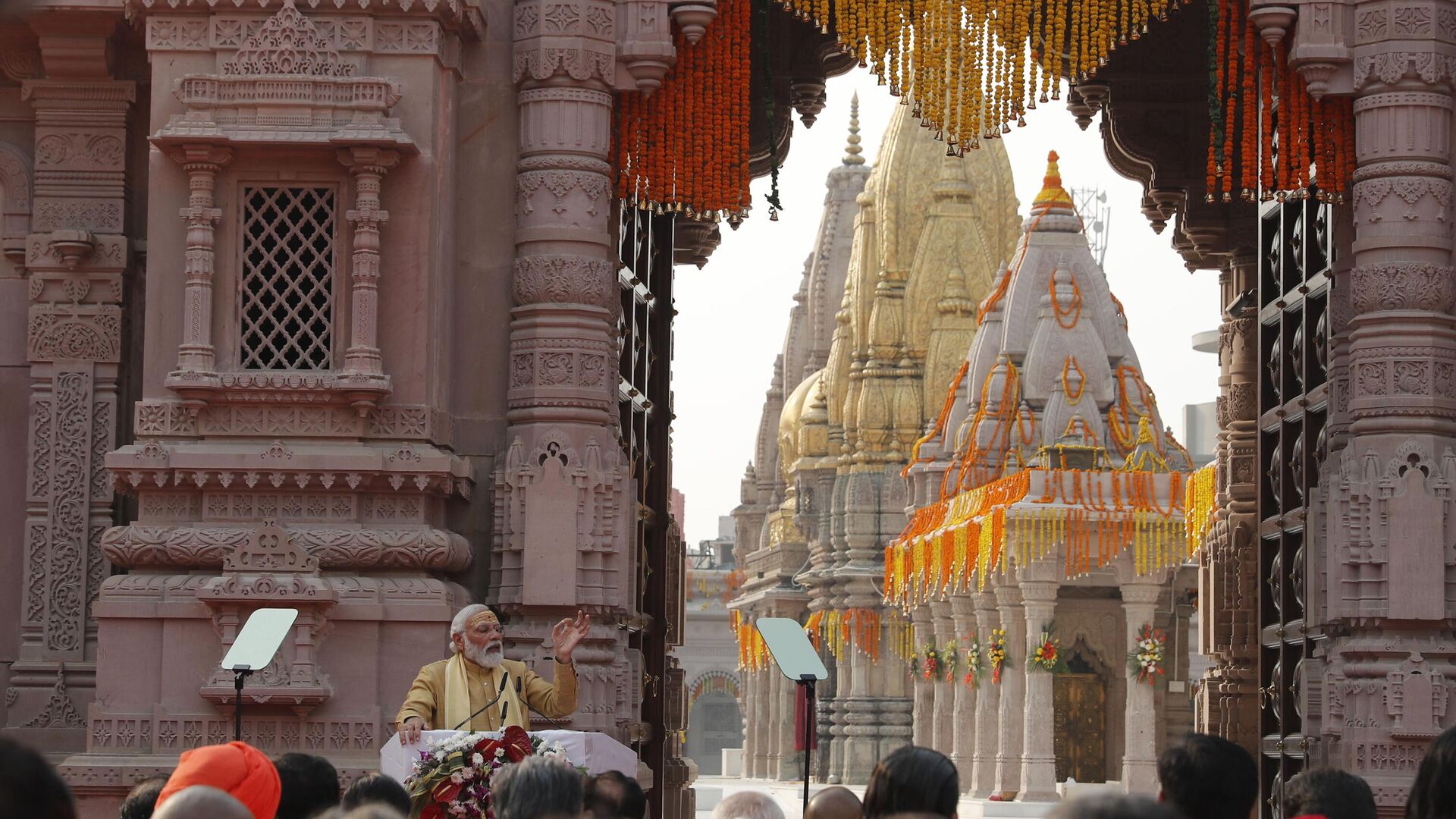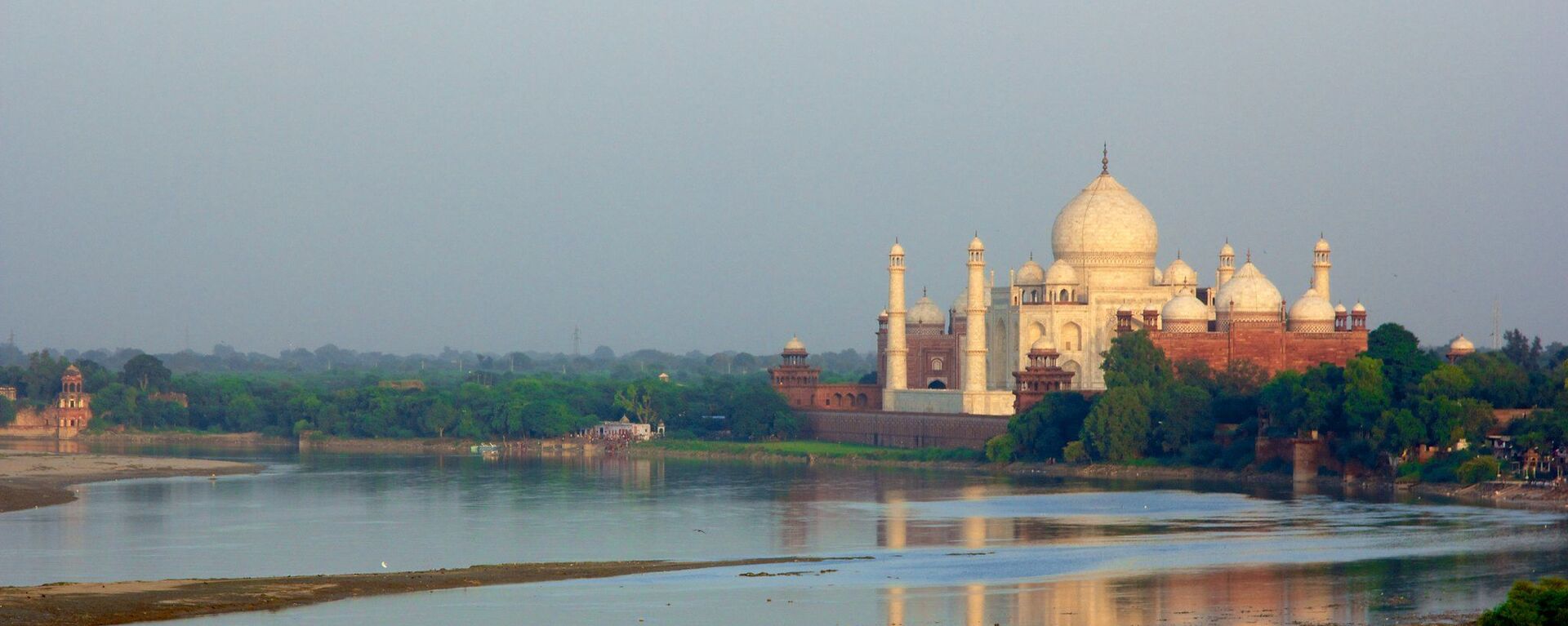https://sputniknews.in/20230906/explained-significance-of-bharat-in-indias-renaming-controversy-4071894.html
Explained: Significance of Bharat in India's Renaming Controversy
Explained: Significance of Bharat in India's Renaming Controversy
Sputnik India
Speculation is rife that the Government of India is set to introduce a resolution, officially renaming the county to "Bharat" during this month's special session of parliament.
2023-09-06T18:51+0530
2023-09-06T18:51+0530
2023-09-06T19:05+0530
anurag thakur
narendra modi
india
afghanistan
myanmar
bharatiya janata party (bjp)
x (former twitter)
indian national congress (inc)
trinamool congress
bharat
https://cdn1.img.sputniknews.in/img/07e7/09/06/4080122_0:174:3022:1874_1920x0_80_0_0_d24ab97204fa9f3fe11e8e43adeab8c6.jpg
Speculation is rife that the Government of India led by Prime Minister Narendra Modi is set to introduce a resolution, officially renaming the country to "Bharat" during this month's special session of parliament to be held from September 18-22 in New Delhi.Though the government has officially dismissed reports of the nation's name change, federal Information and Broadcasting Minister Anurag Thakur's clarification further intensified the buzz over the matter.Interestingly, Thakur labeled the reports as "rumors". But he also derided the opponents of "Bharat".The row over the renaming of "India" began after the country's main opposition party, Congress, claimed that the central government was preparing a draft on the issue.This came after invitations sent to foreign delegates for the G-20 summit from the President's office saw "President of Bharat" written over them instead of the customary "President of India".The History and Origins of BharatHowever, if one talks about the historical context of "Bharat", India was called by this name for centuries before the British took control of the sub-continent in the 18th century.Names like Bharat, Bharata Khanda, and Bharatavarsha have been primarily used in the Sanskrit language for undivided India that stretched from Afghanistan in the east to Myanmar in the West.This vast geographical region comprises present-day Afghanistan, Pakistan, India, Bangladesh, Bhutan, Tibet, Nepal and parts of Myanmar.Bharat and the MahabharataThe origins of "Bharat" can be traced back to the Mahabharata era. The Hindu epic of Mahabharata features a legendary king called "Bharata" in whose honor the abovementioned land area spanning from Afghanistan to Myanmar was named "Bharat".As per Hindu religious scriptures, emperor Bharata was the son of King Dushyanta and Queen Shakuntala (daughter of sage Vishvamitra).He was initially named Sarvadamana (a subduer of all) but came to be known as Bharata for his successful efforts at uniting the Indian sub-continent under one central unifying force with several monarchies flourishing under his guidance.Also, Bharata is linked with the Pandavas, the central figures of the Mahabharata, who are worshipped across India. He was the father of King Shantanu, the great-grandfather of the Pandavas.Modi's 'Bharat' Ace Delivered to Subdue 'INDIA'Notably, the development comes in the backdrop of the country's fractured opposition uniting under one umbrella, which they have named "INDIA"."INDIA" is an acronym for the Indian National Developmental Inclusive Alliance, which is a combination or alliance of over 25 political parties of the South Asian nation, who plan to jointly fight the 2024 national polls against the BJP.The 2024 general elections are crucial for both the BJP and Congress, more so for the former, given that Prime Minister Narendra Modi will be seeking a third straight term in office.If Modi and his party win next year, he will become the first Indian leader to emerge victorious in three consecutive national elections.On the other hand, Congress has ruled India for nearly 60 years since independence but has been out of power since 2014.Hence, winning the 2024 polls against Modi is considered vital for the grand old party to keep its flock together as well as to stay politically relevant in Indian politics.In this light, political watchers believe that the reported renaming of "India" to "Bharat" was an ace delivered by Prime Minister Modi to outfox the opposition in the game of political upmanship.Yet the name "Bharat" resonates with a vast majority of the country, especially with the people of rural hinterlands.For instance, former national cricket team batter Virender Sehwag, who calls himself a farmer's son, opined that the nation's current name "India" was a symbol of the country's colonial past and that's why needed to be changed.
https://sputniknews.in/20230905/india-wants-to-change-its-name-4052359.html
india
afghanistan
myanmar
delhi
new delhi
pakistan
nepal
tibet
bangladesh
bhutan
Sputnik India
feedback.hindi@sputniknews.com
+74956456601
MIA „Rossiya Segodnya“
2023
Pawan Atri
https://cdn1.img.sputniknews.in/img/07e6/0c/13/139630_147:0:831:684_100x100_80_0_0_8fa2b25903e7787fe6a2698552c167df.png
Pawan Atri
https://cdn1.img.sputniknews.in/img/07e6/0c/13/139630_147:0:831:684_100x100_80_0_0_8fa2b25903e7787fe6a2698552c167df.png
News
en_IN
Sputnik India
feedback.hindi@sputniknews.com
+74956456601
MIA „Rossiya Segodnya“
Sputnik India
feedback.hindi@sputniknews.com
+74956456601
MIA „Rossiya Segodnya“
Pawan Atri
https://cdn1.img.sputniknews.in/img/07e6/0c/13/139630_147:0:831:684_100x100_80_0_0_8fa2b25903e7787fe6a2698552c167df.png
india name change, india to change country name, india to be renamed bharat, what is india's new name, india's new name, india to be renamed as bharat, india to shun colonial name, india to be rechristened bharat, india's new name, bharat, king bharata, origins of bharat, bharata in mahabharata, mahabharata context of bharat, why india is called bharat,
india name change, india to change country name, india to be renamed bharat, what is india's new name, india's new name, india to be renamed as bharat, india to shun colonial name, india to be rechristened bharat, india's new name, bharat, king bharata, origins of bharat, bharata in mahabharata, mahabharata context of bharat, why india is called bharat,
Explained: Significance of Bharat in India's Renaming Controversy
18:51 06.09.2023 (Updated: 19:05 06.09.2023) India has been in the midst of an escalating political controversy since Tuesday after the opposition Congress and the federally ruling Bharatiya Janata Party (BJP) traded barbs over the renaming of the country.
Speculation is rife that the Government of India led by Prime Minister Narendra Modi is set to introduce a resolution, officially renaming the country to "Bharat" during this month's special session of parliament to be held from September 18-22 in New Delhi.
Though the government has officially dismissed reports of the nation's name change, federal Information and Broadcasting Minister Anurag Thakur's clarification further intensified the buzz over the matter.
"I think these are just rumors which are taking place. All I want to say is that anyone who objects to the word Bharat clearly shows the mindset," Thakur told media persons on Wednesday.
Interestingly, Thakur labeled the reports as "rumors". But he also derided the opponents of "Bharat".
The row over the renaming of "India" began after the country's main opposition party, Congress, claimed that the central government was preparing a draft on the issue.
This came after invitations sent to foreign delegates for the G-20 summit from the President's office saw "President of Bharat" written over them instead of the customary "President of India".
The History and Origins of Bharat
However, if one talks about the historical context of "Bharat", India was called by this name for centuries before the British took control of the sub-continent in the 18th century.
Names like Bharat, Bharata Khanda, and Bharatavarsha have been primarily used in the Sanskrit language for undivided India that stretched from Afghanistan in the east to Myanmar in the West.
This vast geographical region comprises present-day Afghanistan, Pakistan, India, Bangladesh, Bhutan, Tibet, Nepal and parts of Myanmar.
Bharat and the Mahabharata
The origins of "Bharat" can be traced back to the Mahabharata era. The Hindu epic of Mahabharata features a legendary king called "Bharata" in whose honor the abovementioned land area spanning from Afghanistan to Myanmar was named "Bharat".
As per Hindu religious scriptures, emperor Bharata was the son of King Dushyanta and Queen Shakuntala (daughter of sage Vishvamitra).
He was initially named Sarvadamana (a subduer of all) but came to be known as Bharata for his successful efforts at uniting the Indian sub-continent under one central unifying force with several monarchies
flourishing under his guidance.
Also, Bharata is linked with the Pandavas, the central figures of the Mahabharata, who are worshipped across India. He was the father of King Shantanu, the great-grandfather of the Pandavas.
Modi's 'Bharat' Ace Delivered to Subdue 'INDIA'
Notably, the development comes in the backdrop of the country's fractured opposition uniting under one umbrella, which they have named "INDIA".
"INDIA" is an acronym for the Indian National Developmental Inclusive Alliance, which is a combination or alliance of over 25 political parties of the South Asian nation, who plan to jointly fight the 2024 national polls against the BJP.
The 2024 general elections are crucial for both the BJP and Congress, more so for the former, given that Prime Minister Narendra Modi will be seeking a third straight term in office.
If Modi and his party win next year, he will become the first Indian leader to emerge victorious in three
consecutive national elections.
On the other hand, Congress has ruled India for nearly 60 years since independence but has been out of power since 2014.
Hence, winning the 2024 polls against Modi is considered vital for the grand old party to keep its flock together as well as to stay politically relevant in Indian politics.
In this light, political watchers believe that the reported renaming of "India" to "Bharat" was an ace delivered by Prime Minister Modi to outfox the opposition in the game of political upmanship.
Yet the name "Bharat" resonates with a vast majority of the country, especially with the people of rural hinterlands.
For instance, former national cricket team batter Virender Sehwag, who calls himself a farmer's son, opined that the nation's current name "India" was a symbol of the country's colonial past and that's why needed to be changed.
"I have always believed a name should be one which instills pride in us. We are Bhartiyas, India is a name given by the British and it has been
long overdue to get our original name 'Bharat' back officially," he wrote on X, formerly Twitter.



